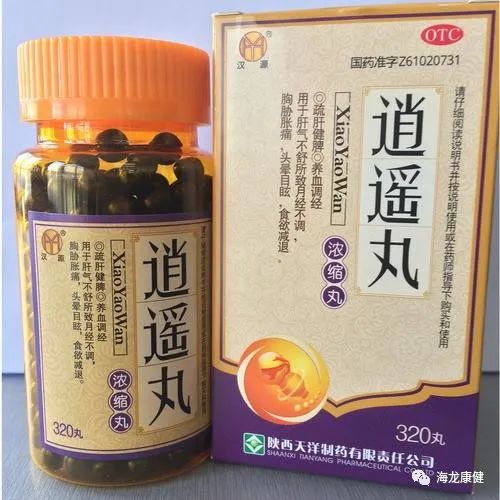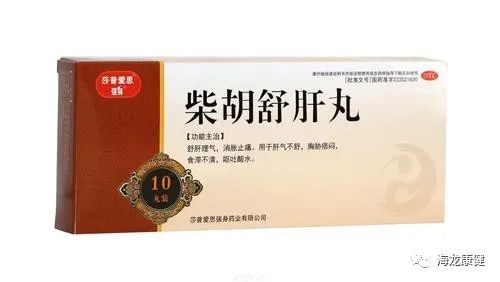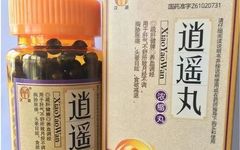Common Chinese patent medicines for liver qi stagnation: Chai Hu Shu Gan San (Bupleurum Liver-Soothing Powder) has the effects of invigorating blood, relieving pain, and soothing the liver and regulating qi. It can effectively improve symptoms caused by liver qi stagnation, such as pain in the hypochondrium, emotional depression, irritability, belching, abdominal distension, and wiry pulse. Mu Xiang Shun Qi Wan (Aucklandia Qi-Regulating Pill) has the effects of promoting qi, transforming dampness, and strengthening the spleen and stomach. It can effectively improve symptoms caused by liver qi stagnation, such as disharmony between the liver and stomach, discomfort in the hypochondrium, chest tightness, and reduced appetite. Si Hai Shu Yu Wan (Four Seas Soothe Depression Pill) has the effects of regulating qi, soothing depression, and resolving phlegm. It is used to treat symptoms caused by liver qi stagnation, such as chest tightness, frequent sighing, thin white tongue coating, and wiry pulse.
1. Xiao Yao Wan (Free and Easy Wanderer Pill)

Xiao Yao Wan is composed of Chai Hu (Bupleurum), Dang Gui (Angelica Sinensis), Bai Shao (White Peony), Bai Zhu (White Atractylodes), Fu Ling (Poria), Bo He (Mint), Sheng Jiang (Fresh Ginger), and Gan Cao (Licorice). It has the effects of soothing the liver, strengthening the spleen, nourishing blood, and regulating menstruation. It can be used to treat symptoms caused by liver qi stagnation and spleen deficiency, such as irregular menstruation, dizziness, reduced appetite, and pain in the chest and hypochondrium. Patients experiencing the above symptoms may use this medicine under medical advice.
What diseases can Xiao Yao Wan treat?
This product has the effects of soothing the liver, strengthening the spleen, and nourishing blood, mainly used for treating symptoms such as hypochondriac pain, stomach pain, depression, irregular menstruation, and dizziness caused by liver qi stagnation and spleen deficiency.
What symptoms can Xiao Yao Wan relieve?
Hypochondriac pain: Caused by liver qi stagnation and liver overacting on spleen, symptoms include distending pain in both hypochondria, bitter mouth, dry throat, abdominal distension after eating.
Stomach pain: Caused by liver qi stagnation and disharmony between the liver and stomach, symptoms include distending pain in the stomach radiating to both hypochondria, frequent belching, worsening fullness after eating, and symptoms of gastric prolapse and indigestion.
Depression: Caused by emotional distress, liver qi stagnation, and disharmony between liver and spleen, symptoms include low mood, unhappiness, frequent sighing, chest tightness, abdominal distension with loose stools, and irritability with insomnia.
Irregular menstruation: Caused by liver qi stagnation and disharmony of the Chong and Ren channels, symptoms include irregular menstrual cycles, irritability before menstruation, breast tenderness, abdominal pain during menstruation, and abdominal distension with loose stools.
Dizziness: Caused by liver qi stagnation, failure of the liver to disperse, and disharmony of qi and blood, with spleen deficiency leading to failure of clear yang to rise, symptoms include dizziness that worsens with emotional fluctuations, accompanied by irritability, insomnia, and loose stools.
What are the differences between Xiao Yao Wan, Dan Zhi Xiao Yao Wan, and Jia Wei Xiao Yao Wan in treating diseases?
From the perspective of efficacy:
Xiao Yao Wan soothes the liver, strengthens the spleen, nourishes blood, and regulates menstruation, mainly used for treating discomfort due to liver qi stagnation and spleen deficiency, hypochondriac pain, dizziness, reduced appetite, and irregular menstruation.
Jia Wei Xiao Yao Wan has the effects of soothing the liver and clearing heat, strengthening the spleen and nourishing blood, used for liver qi stagnation with blood deficiency, disharmony between liver and spleen, hypochondriac distension and pain, dizziness, fatigue, reduced appetite, irregular menstruation, and abdominal distension.
Dan Zhi Xiao Yao Wan soothes the liver, relieves depression, clears heat, and regulates menstruation, used for liver qi stagnation transforming into fire, hypochondriac distension and pain, irritability, red cheeks, dry mouth, reduced appetite or tidal fever, as well as women’s early menstruation, difficult menstruation, and breast and lower abdominal distension. In summary, for the three patterns of “liver qi stagnation, spleen deficiency, and blood deficiency,” Dan Zhi Xiao Yao Wan enhances the effect on liver qi stagnation (stagnation transforming into fire). For liver qi stagnation, the order of efficacy is Dan Zhi Xiao Yao Wan > Jia Wei Xiao Yao Wan > Xiao Yao Wan.
2. Chai Hu Shu Gan Wan (Bupleurum Liver-Soothing Pill)

Chai Hu Shu Gan Wan is a Chinese patent medicine composed of Fu Ling (Poria), Fu Chao Zhi Ke (Fried Bitter Orange), Cu Xiang Fu (Vinegar-Processed Cyperus), Cu Wu Ling Zhi (Vinegar-Processed Rhizoma Zingiberis), Dou Kou (Cardamom), Chen Pi (Dried Tangerine Peel), Jie Geng (Platycodon), and Jiang Hou Po (Thick Magnolia Bark). What symptoms can Chai Hu Shu Gan Wan relieve?
This product has the effects of soothing the liver, regulating qi, and relieving distension and pain. It is used to relieve symptoms such as liver qi stagnation, chest and hypochondriac fullness, food stagnation, and vomiting of sour fluids.
Fullness: Often caused by liver qi stagnation affecting the spleen and stomach, leading to abnormal rising and falling, resulting in fullness in the middle. Symptoms include chest and hypochondriac fullness, fullness without pain, frequent sighing, belching, thin white tongue coating, and a slow wiry pulse; chronic hepatitis, acute and chronic gastritis, and gastric and duodenal ulcers may present with the above symptoms.
Vomiting of sour fluids: Often caused by liver qi invading the stomach and spleen failing to function properly. Symptoms include vomiting sour fluids, fullness and noise in the abdomen, food stagnation, reduced appetite, and worsening with emotional factors, with a slightly greasy tongue coating and a deep slow pulse; acute and chronic gastritis, gastric and duodenal ulcers may present with the above symptoms.
Fullness and noise often refer to the sensation of fullness in the abdomen after eating, with a feeling of hunger accompanied by a burning sensation. Patients experiencing fullness and noise often indicate chronic gastritis, gastric and duodenal ulcers, and other gastric diseases.
Hypochondriac pain: Often caused by liver qi stagnation obstructing the hypochondriac channels. Symptoms include distension and fullness in the hypochondria, pain that varies with emotions, chest tightness, shortness of breath, frequent sighing, thin white tongue coating, and a slow wiry pulse; chronic hepatitis and chronic cholecystitis may present with the above symptoms.
3. Yue Ju Wan (Escape Resentment Pill)

Yue Ju Wan consists mainly of Cu Xiang Fu (Vinegar-Processed Cyperus), Chuan Xiong (Ligusticum), Chao Zhi Zi (Fried Gardenia), Chao Cang Zhu (Fried Atractylodes), and Chao Liu Shen Qu (Fried Fermented Wheat). It can regulate qi, relieve depression, and eliminate fullness. Clinically, if patients experience symptoms such as chest and abdominal fullness, abdominal distension, food stagnation, and belching of sour fluids, they may take this medicine under the guidance of a physician.
What diseases can Yue Ju Wan treat?
It is suitable for functional dyspepsia, peptic ulcers, chronic gastritis, cholelithiasis, cholecystitis, hepatitis, intercostal neuralgia, dysmenorrhea, and irregular menstruation that are identified as liver and spleen qi stagnation.
What symptoms can Yue Ju Wan relieve?
This product can be used to treat chest and abdominal fullness, abdominal distension, food stagnation, and belching of sour fluids.
Symptoms of depression caused by liver qi stagnation include mental depression, emotional instability, chest and hypochondriac pain, abdominal fullness with belching, and irregular menstruation in women; hypochondriac pain, symptoms include unilateral or bilateral hypochondriac pain that worsens with emotional distress, fullness and sour belching.
Stomach pain caused by disharmony between liver and stomach, symptoms include distension and pain, abdominal fullness with poor appetite; vomiting, symptoms include nausea, vomiting, food stagnation, hiccups, and belching of sour fluids.
Breast lumps caused by phlegm and blood stasis due to liver qi stagnation, symptoms include breast tenderness, dark menstrual flow, abdominal distension, and frequent sighing.
1. Frequent sighing, feeling slightly relieved after sighing. 2. Emotional instability, depression, sensitivity, irritability, etc.
3. Poor appetite, discomfort or pain in the stomach.
4. Chest and abdominal pain.
5. Women may experience irregular menstruation, dysmenorrhea, and premenstrual breast hyperplasia.
6. Sensation of a foreign body in the throat.
7. Dizziness and tinnitus when angry.
8. Tension, anxiety, and frequent insomnia.
9. Skin issues such as spots, acne, yellowish complexion, and rough skin. 10. Dry, painful eyes, and blurred vision.
The tongue characteristics of liver qi stagnation:
1. The tongue has vertical lines in the middle, with a coating on both sides and two lines. The tongue surface appears unclean and uneven.
2. When liver qi is stagnant, the tongue surface may have a turbid coating, the tongue body is reddish, the coating is yellow, or there may be purple spots.
3. Liver qi stagnation may lead to symptoms such as chest tightness, breast tenderness, hypochondriac distension, and abdominal fullness, or the appearance of neck lumps.
Embrace health and wellness, let’s learn and grow together.
Daily updates on Kuaishou videos! For more information, please follow our Kuaishou account!!


